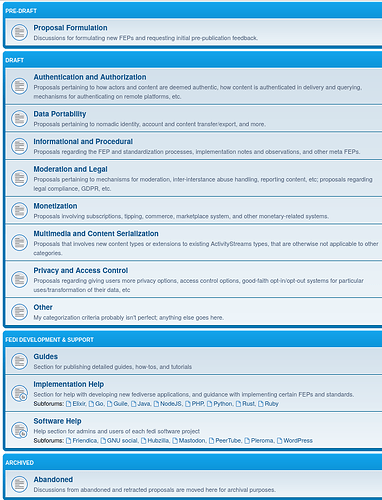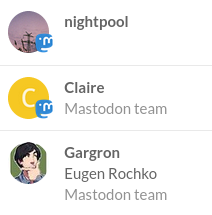While I haven’t really been an active participant in discussions on this medium, and probably not up-to-speed on all the past decision-making, history, and processes—it feels like something isn’t working.
It feels like it’s a specific selection of reoccurring participants, while most other developers have just tuned SocialHub out entirely. Generally I see complaints that it’s hard to keep up with relevant topics, new relevant FEPs, or the inability to have meaningful influence.
Platform
I can’t really pin down all of the complaints I have, as I don’t know if I just have adjustment difficulties with using Discourse (which seems more free-form) versus dealing with a conventional forum-section hierarchy, or other specific UX/UI design patterns. For example, with just structure/categorization for something process-oriented, I’d normally visualize a hierarchy like (the categorization, not the web design):
Also, some parts of Discourse’s design feels like it’s trying to overly de-clutter the interface (compared to phpBB/vB/etc) and squeeze down how much content is shown on the screen at a time, to where it’s a little constricting. For example, on traditional forums, you’d usually have a mini-profile next to each post, with a few specific profile fields shown. In Discourse, you have to click through each profile, to gain a little context about the poster; it was only a week or two ago that I even realized there was a dev from Mastodon or Friendica fairly active on here. A lot of other users I still have zero idea what their interest/stake in the forum is (but that’s because they haven’t filled anything out).
Process
I’m assuming the FEP process was motivated more to get existing projects to open up and document any extensions they’ve made in their project, so that it’s easier for others to interoperate. On this platform, it feels like kind of a one-sided relationship, where it’s about someone pushing out a FEP, and expecting others to follow. It doesn’t feel like a broader collaborative effort, more just a system of calling for feedback and edits (or just documenting the behavior in their software only), rather than something that starting with a discussion, and trying to piece together what other projects want to see, and then working it into a FEP.
Tangentially: We have one system for quote-posts in production that never had a FEP, we have another proposal as a published and implemented FEP, and we supposedly have another vendor privately working on their own possibly-incompatible proposal that is intended to be dropped on everyone as their own FEP. I understand that nothing about the FEP process could probably fix this, but part of it feels like there’s still a problem with finding a good communication/collaboration medium or structure between projects, that vendors just choose to not go through the hassle of collaborative discussions.
Another pattern is that it feels like people just want to write up their own FEPs, without even having to implement it themselves, and that it’s merely just encouraged for an implementation to exist. In my worldview, it should usually be a requirement to have at least two independent implementations being able to implement a FEP (if the FEP calls for anything behavioral in software), from the specification alone, before it can be recognized as a stable standard. Just one person implementing their own idea in their own software isn’t enough, because it doesn’t ‘field test’ the specificity of the FEP.
Within the same day as an important security update pushed out in Mastodon, Misskey, and other projects: someone’s already pushing out a FEP to steer validation/verification criteria for implementors, before there’s been a more careful discussion. There are a lot of avenues to addressing recently spotlighted problems, but pushing one suddenly-revealed option feels very haphazard.
–
Nonetheless, these are my passive observations I’ve had in orbiting this forum for several months or so (on-and-off) that I’m sure I have some misconceptions, or of there being previous important posts I’ve overlooked, etc. There are a few things I’d like to get in motion with my own server implementation, but it doesn’t feel right to just shove out a FEP right away, as I’d rather check with what makes sense first. But also, there’s only a narrow selection of developers of projects active here, that I don’t even know if anything proposed/formulated here will get sufficient feedback to make a FEP that gains tangible adoption.

